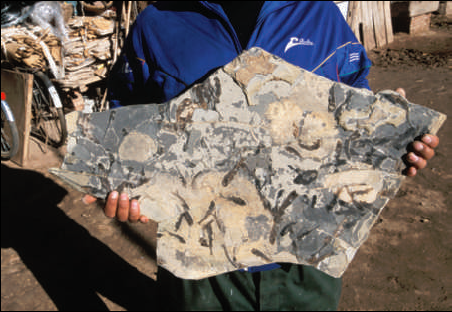| Location: Home > News > Events |
| Nature: Fossil protection law comes under fire |
|
Vol 460|27 August 2009 NATURE|Vol 460|27 August 2009
Chinese palaeontologists met government officials in Beijing last week to lobby for strict federal control of fossil specimens. The researchers are working to get changes incorporated into a draft law released in March by the Legislative Office of the State Council, which advises China’s leaders, and the Ministry of Land and Resources.As China has experimented with private enterprise, poor farmers have burrowed into hillsides, uncovering fossils from the Cretaceous to the Jurassic that have rewritten the palaeontological literature. With international traders paying tens of thousands of dollars for important finds, provincial officials have fought with the federal government for control over permits to dig and regulate the bounty.Yet many scientists inside and outside China fear that the proposed federal law may foster the rampant trade in illegal fossil specimens. Zhou Zhonghe, director of the Institute of Vertebrate Paleontology and Paleoanthropology in Beijing, and other researchers have proposed several changes. These would include giving the land and resources ministry authority over vertebrate fossil collections, and setting up a national panel of palaeontologists to regulate the collections on a nationwide level. “I think many of our suggestions will be adopted,” Zhou says.The law isn’t expected to be finalized until early next year. The process is being watched closely by researchers worldwide who collaborate with Chinese palaeontologists. “I am in complete support of the Chinese government and academic institutions trying to clarify the laws to protect their tremendous fossil heritage,” says palaeontologist Mark Norell of the American Museum of Natural History in New York. Palaeontologist Gao Keqin, of Peking University, remains deeply concerned. He says that recent versions of the draft law would not prevent provincial officials from blocking research by demanding large sums from scientists.“The current situation is problematic because local jurisdictions with rightful interests but only a vague understanding of the scientific value of fossils can unilaterally stop legitimate scientific exploration,” says James Clark, a palaeontologist at George Washington University in Washington DC.Many provinces built palaeontological museums in the hope of tapping the tourist trade, but fossil smugglers often use them as a front to buy and sell specimens. “Fossils require an institution with staff educated in curation and preservation,” says Clark. “But few places in China have these facilities.”“I hope the new law will let us protect the fossil heritage,” says Zhou.
Fossils found in Chinese rock formations have fuelled a cottage
Rex Dalton
Vol 460|27 August 2009 NATURE|Vol 460|27 August 2009 |
